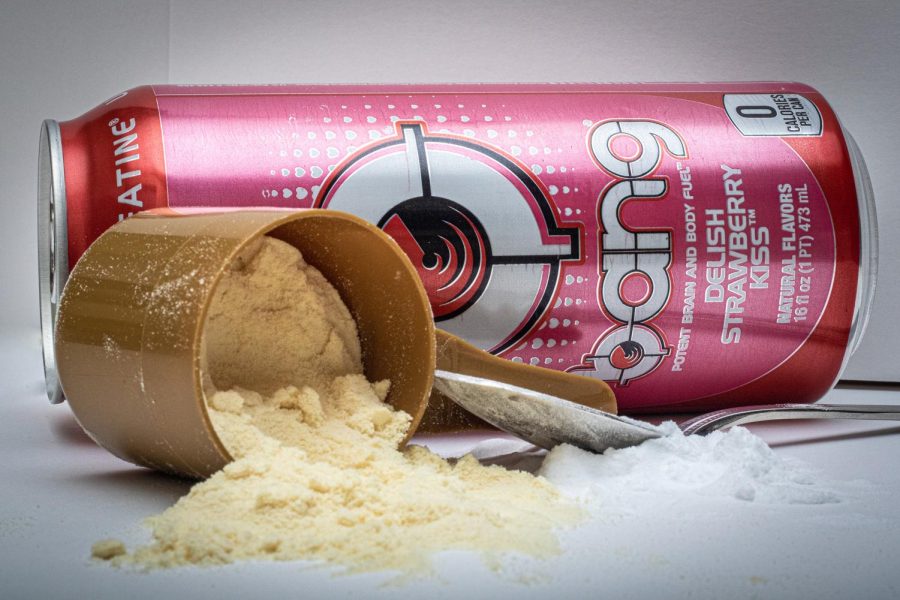Fueling the fight
A look into how athletes power their bodies through everything from training and competition to a long day at school.
According to pediatricians athletes and people in general under the age of 18 should avoid performance-enhancing supplements like creatine.
In this day and age, being a high school athlete is easier said than done. They squat over 300 pounds, run just over four-minute miles and are recognized nationwide for their work in the classroom. From early morning weights and practices to late-night bus rides, it takes a lot to make sure their bodies are not only fueled for the day, but prepared to train and compete.
For volleyball player and high jumper Raina Pfeifer ’22, fueling her body became a little harder than usual when she decided to go vegan the summer of her sophomore year. Soon after, she started to share her way to fuel her own fight as a high school athlete via her Instagram account @raisfuel.
“I kinda just wanted to share some stuff just being like ‘Oh this is what I made’ you can do it and still be an athlete and legitimately be healthy and stuff like that,” Pfeifer said.
While competing in a fall sport and making her way through the daunting college admissions process, Pfeifer made sure that she along with her teammates focused on what and how much food their diet consisted of, in order to perform at the highest level.
“I think it’s a lot easier to focus on the things you can control … like making sure you are eating enough because I know a lot of athletes don’t eat enough and it really hinders your performance if you don’t have enough energy to compete at a high level,” Pfeifer said. “So making sure I’m fueling myself well and trying to help the other people on my volleyball team being like ‘Do y’all have snacks?’ and like ‘Have you guys eaten before games?’”
As showcased on her Instagram account with over fourteen hundred followers Pfeifer makes sure every one of her vegan meals incorporates everything she needs to fuel her body as a student athlete.

However, when it comes to having a vegan diet, some animal products that house key nutrients seem to slip away. In order to make sure she isn’t missing a step when it comes to fueling her body Pfeifer fills in the cracks with supplements.
“I use protein powder like every single day,” Pfeifer said. “I use creatine sometimes… I think it’s one of the more scientifically backed products some of the other ones are kinda bogus but that one has actual studies about it that shows that it actually works.”
In choosing not to eat animal products like fish, meat, poultry, eggs, and dairy products, Pfeifer takes Vitamin B-12 and creatine supplements because she misses out on them in animal products.
Creatine is a natural substance found in muscles that helps produce energy when doing high-intensity workouts. The word “creatine” carries multiple meanings in high schools nationwide. In the past, people would see it as a type of steroid that athletes would secretly use in hopes of becoming bigger and stronger than everyone. But, in today’s world, it’s a scientifically proven supplement that simply helps athlete’s bodies produce more energy during various workouts, allowing them to build muscle faster under certain conditions.
According to the American Academy of Pediatrics and the American College of Sports Medicine, athletes and people in general under the age of 18 should avoid performance-enhancing supplements like creatine. This puts athletes and their parents in a tough situation, athletes want to do whatever it takes to win but parents want to make sure they are staying healthy in the process.
Despite the accredited institutions’ recommendations, high school athletes still find a way to safely use creatine alongside support from their parents.
Award-winning Physical Education teacher Erika Mundt incorporates lessons on hydration, sleep, diet and nutrition throughout her classes at West High.
“The big things that we stress are the way you eat matters and getting things from natural sources is always better,” Mundt said.
When it comes to addressing students that are looking to boost their gains in the weight room Mundt simply tries to educate them in hopes of helping them make the best decision for that student.
“I always tell kids to look for at the bottom of everything, there are little markers to say that things have been tested and we tell them to try to look for one that has three [companies or orgaizations] because that means at least three outside sources have tested that product and are willing to put their stamp on it to say that what’s in it is actually in the ingredients,” Mundt said. “A lot of that stuff is not FDA approved and is not held accountable, so companies will change names of ingredients they will change things just to try to slip stuff in there that isn’t exactly great for you especially when you are young and are still developing.”
In his time at West as a strength and conditioning coach, Brendon Panther has helped direct athletes in and out of the weight room to become better people on and off the playing surface.
As a key part in the process of becoming a better athlete, Panther receives various questions from athletes on how they should approach things like their diet and additional supplements that they may be interested in.
“A supplement no matter what kind of supplement it is is just that, it’s supposed to be a supplement. It’s supposed to be ‘Well I’m taking care of all these things, I’m eating vegetables and fruits, drinking water and getting meat and dairy. But this is just to fill in the cracks,’” Panther said. “It shouldn’t be your first go to ‘Oh I’m not performing very well let just go see if I can take some creatine that will fix it.’”
In hopes of enhancing their workouts or even powering through a long night of homework, many high schoolers use energy drinks and pre-workout to fuel their bodies.
“Instead of being tired, it’s like you just woke up, it resets your day, your energy level goes back up your drive to do more stuff goes back up,” said football player and wrestler Brett Pelfrey ’22.

The popular fruity-flavored fizzy drinks and powders that seem harmless contain anywhere from 85 to 300 milligrams of caffeine.
“It’s kind of a slippery slope … if you can get a workout in without using it you are better off because a lot of people once they start using a lot of caffeine then they have trouble not using it and then they can only perform or train if they’ve got that,” Panther said. “Then you get into this cycle of all the conditions have to be just perfect for me to perform and if some little thing is off then it throws me off completely and I don’t know how to get a good training session in.”
Whether it’s through diet, supplements or caffeine what athletes put into their bodies will forever be the fuel to their fight on the playing surface and in the classroom.
“I will always tell students to eat more natural foods, eat more healthy foods,” said Mundt. “Eat more foods that are made without processing and that is the number one way [to safely fuel your body].”
Your donation will support the student journalists of West High School. Your contribution will allow us to purchase Scholarship Yearbooks, newsroom equipment and cover our annual website hosting costs.

Owen Aanestad is a senior at West. This is his third year on staff working for the online publication as the online editor-in-chief In addition to playing...



 ? (@raisfuel)
? (@raisfuel)